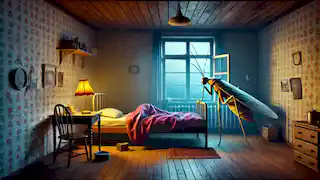Gregor Samsa awoke one morning from uneasy dreams and found himself transformed into a monstrous vermin. He was lying on his hard, armor-like back, and when he raised his head slightly, he saw his dome-like brown belly divided into stiff, arched segments. His numerous legs, which were pitifully thin compared to the rest of his body, flickered helplessly before his eyes.
“What has happened to me?” he thought. It was no dream. His room, a regular human room, though a little small, lay quiet between the four familiar walls. Above the table, where a collection of textile samples lay spread out—Samsa was a traveling salesman—hung a picture he had recently cut out of an illustrated magazine and put in a pretty gilded frame. It showed a lady fitted out with a fur hat and fur boa, who sat upright, raising a heavy fur muff that covered her whole forearm towards the viewer.
Gregor’s glance then turned to the window. The dreary weather—the raindrops were falling audibly on the metal window ledge—made him quite melancholy. “What if I went back to sleep for a while and forgot all this nonsense,” he thought, but that was entirely out of the question. He was used to sleeping on his right side, but in his present state, he was unable to get into that position. No matter how hard he threw himself onto his right side, he rocked back into the supine position. He must have tried it a hundred times, closing his eyes in an effort to ignore the mess, only to roll back in defeat.
“Oh God,” he thought, “what an exhausting job I’ve chosen! Day in, day out, on the road. It’s far more exhausting than any office job, and I’m tormented by the worry of getting back to work on time.”
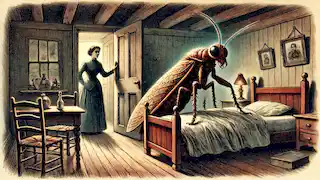
The alarm clock on the table ticked loudly, as if to remind him of the ever-passing time. Gregor looked at it anxiously. “Good heavens!” he thought. It was half-past six, and the next train was leaving at seven! He would never make it in time. The maid had certainly not woken him up, and he was already on the verge of becoming the boss’s laughingstock.
The manager had been threatening to sack him for weeks, as Gregor often struggled to keep up with his demanding work. He felt like a cog in a machine, barely getting a break from the relentless grind. His mother, knocking on the door from the other side, called softly, “Gregor, aren’t you getting up? You’ve slept long enough!”
Gregor tried to respond but found his voice was no longer his own. Instead, a strange, garbled sound escaped his lips, more like an insect’s buzzing than human speech. His mother, startled, repeated herself: “Gregor, are you all right? Do you need help?” But all Gregor could do was make that bizarre sound again.
Suddenly, he heard the clatter of footsteps coming down the hall. It was his father, pounding on the door. “Gregor, open up! The manager is here. He’s come to see why you’re not at work!”
Gregor panicked. The manager himself? This was a disaster. He had to do something, had to move, but his body refused to cooperate. His legs twitched, his hard shell creaked as he struggled to inch toward the edge of the bed. All the while, his father kept shouting and the manager began to speak, clearly growing more impatient with each passing moment.
“Mr. Samsa!” the manager called out. “You’re neglecting your duties, and I must inform you that your performance is becoming quite unsatisfactory. If this continues, I will have no choice but to terminate your employment.”
Those words struck Gregor with horror. Fired? How could his family survive without his income? They depended on him to pay the rent, to keep the household afloat. He forced himself to move again, pushing against the bed with his strange new limbs, only to slide back in an awkward heap.
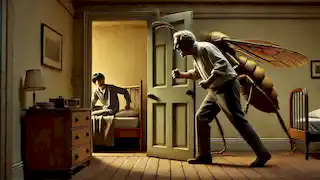
Meanwhile, outside the door, his sister, Grete, was wringing her hands in distress. “Please, Gregor, let us help you! Why won’t you answer?”
Inside, Gregor was frantic. He knew he had to get up and show himself, but how? His body was now something foreign to him, a bizarre and uncooperative mass. Desperation began to creep in as he made one last push with all his might, causing the entire bed to rock slightly. He teetered on the edge of the mattress, nearly falling, before managing to get a few legs onto the floor. But now what? How was he supposed to walk? He couldn’t seem to make sense of his new anatomy.
Time dragged on as the shouting outside grew louder and more impatient. At last, Gregor managed to twist the key in the lock using his mouth—his legs were of no use—and opened the door with great difficulty. He crawled out into the open, revealing his hideous new form.
His mother let out a scream of horror. His father stepped back, eyes wide with disbelief. The manager, however, recoiled in absolute revulsion. Gregor’s transformation was complete, and the sight of him was more than anyone could bear.
At first, there was only silence. Then the manager turned on his heel and fled the apartment without another word, leaving Gregor and his family alone in a tense, suffocating silence.
Grete was the first to speak. “What… what is this?” she whispered, staring at her brother’s grotesque form. Gregor wanted to respond, to explain that it was still him, but all that came out was that same grating noise.
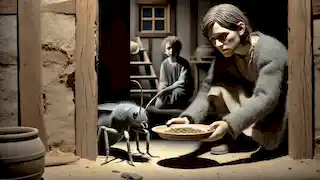
Days passed, and Gregor’s family struggled to come to terms with their new reality. His mother could barely bring herself to look at him, while his father became increasingly hostile. He had been a stern, authoritarian figure before, but now he viewed Gregor as an abomination, a burden. The family’s financial situation worsened as Gregor could no longer work, forcing them to make sacrifices they hadn’t anticipated.
It was Grete, his once beloved sister, who took on the task of caring for him. She brought him food, though he found that he no longer had a taste for the things he once loved. Instead, he preferred spoiled or rotten food, much to her disgust. Despite her initial compassion, it soon became clear that Grete, too, was struggling to cope with the situation. Her visits became less frequent, her interactions with him more distant.
Gregor felt himself becoming increasingly isolated. He longed to communicate, to make them understand that he was still the same person, but his insect-like body prevented any such connection. His family’s growing resentment was palpable, and he knew that they were beginning to see him as nothing more than a grotesque nuisance.
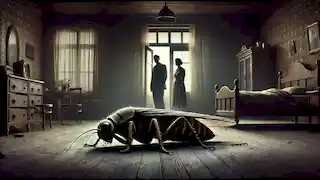
As the days turned into weeks, and weeks into months, Gregor’s condition worsened. He became weaker and more withdrawn, no longer even attempting to move around the apartment. His family, especially Grete, began to discuss him in hushed tones, as though he were already dead. They stopped cleaning his room, allowing dust and grime to accumulate around him, further reinforcing his sense of worthlessness.
Eventually, it was Grete who suggested the unthinkable. “We can’t keep living like this,” she said one evening after dinner. “It’s not Gregor anymore. Whatever that thing is, it’s not our brother.”
Her words, though whispered, reached Gregor’s ears, and they crushed what little spirit he had left. He realized then that he was truly alone. His family had given up on him, and there was no hope for reconciliation.
In the final days of his life, Gregor barely moved. His body, once so alien and uncooperative, had now become a prison of his own making. He lay still, unmoving, as the life drained from him. One morning, when his family awoke, they found him dead.
Gregor’s death was met not with grief, but with relief. The family, at last free from the burden of his existence, moved on with their lives. Grete, once so compassionate, began to blossom into a young woman full of potential. His parents, too, seemed lighter, no longer weighed down by the grotesque creature that had taken over their lives.
And so, Gregor Samsa, who had once been the provider and protector of his family, was forgotten. His metamorphosis, both physical and emotional, had isolated him from those he loved, and in the end, it was that isolation that had led to his downfall.
